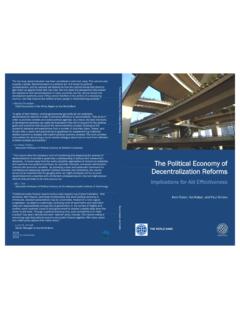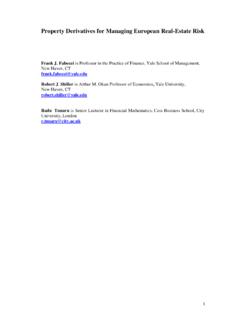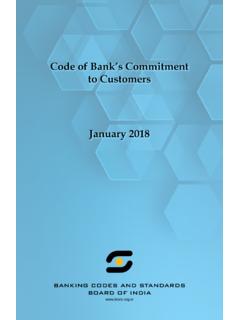Transcription of Bank Competition and Financial Stability: Friends or Foes?
1 bank Competition and Financial stability : Friends or Foes? Thorsten Beck*. June 2008. Abstract: Theory makes ambiguous predictions about the relationship between market structure and competitiveness of the banking system and banking sector stability . Empirical studies focusing on individual countries provide similarly ambiguous results, while cross-country studies point mostly to a positive relationship between Competition and stability in the banking system. Where liberalization and unfettered Competition has resulted in fragility, this has been mostly the consequence of regulatory and supervisory failures.
2 The advantages of Competition for an efficient and inclusive Financial system are strong, and regulatory and supervisory policies should focus on an incentive- compatible environment for banking rather than try to fine-tune market structure or the degree of Competition . Key Words: Financial Institutions, Crises, Market Structure, Government Policy and Regulation JEL Classification: G21, G28, L16. * World bank . This paper was written for the G20 Seminar on Competition in the Financial Sector in Bali, February 2008 and builds on joint work with Asli Demirguc- Kunt and Ross Levine.
3 Comments from Stijn Claessens and participants at the G20. Seminar in Bali are gratefully acknowledged. This paper's findings, interpretations, and conclusions are entirely those of the author and do not necessarily represent the views of the World bank , its Executive Directors, or the countries they represent. 1. Introduction stability concerns are often at the center of banking sector policy debates. After a relatively stable period between World War II and the 1970s, developed and developing countries alike have been hit by banking crises in the three decades since then.
4 While the early years of the 21st century have seen a period of relative banking system stability around the world, recent turbulences linked to the subprime crisis have again caused concerns for policy makers, even in emerging economies that are not at the center of the storm. Competition in the banking market has been at center of the policy debate on Financial stability . As in other, non- Financial , markets Competition is often seen as pre- requisite for an effective banking system. Several theoretical and empirical studies, however, have shed doubts on this proposition, claiming that monopoly rents gives banks higher incentives to invest in relationships with smaller and more opaque Similarly, theoretical and empirical studies have not come to a conclusive finding on the relationship between banking market Competition and stability .
5 There is a notion that excessive Competition can lead to fragility and restraints on Competition are necessary to preserve the stability of the banking system. Activity and branching restrictions put in place after the Financial crises of the 1930s in many industrialized countries had the explicit goal of restricting Competition . Financial liberalization in the 1970s and 1980s resulting in unchecked Competition , on the other hand, has often been blamed for subsequent banking fragility in many developed and developing countries.
6 Unfettered Competition in the Financial system has been partly blamed for the recent boom and subsequent bust in the subprime mortgage market. The past decades have also seen a rapid consolidation of banks around the world, which is intensifying concerns among policymakers about bank concentration, as reflected in major reports by the bank for International Settlements (2001), International Monetary Fund (2001), and the Group of Ten (2001). This consolidation has happened 1. While theory and some empirical work suggest that market power might entice banks to invest in long- term relationships with small and opaque enterprises as they know that they can regain the initial investment in the relationship at a later stage (Petersen and Rajan, 1995; Bonaccorsi di Patti and Dell'Ariccia, 2004), other empirical papers point to the healthy effect of Competition on availability of lending to SMEs (Cetorelli and Strahan, 2004; Beck, Demirg -Kunt and Maksimovic, 2004).
7 See Berger et al. (2004) for an overview. not only within countries, but also across countries. The past decades have seen a wave of foreign bank entry in many developing countries, and, more recently, there have also been cross-border mergers in many developed Financial systems, most notably within Europe. Consolidation has happened both within business lines but also across business lines, resulting in Financial conglomerates that offer commercial and investment banking, insurance and pension fund services.
8 While consolidation has often been justified by efficiency and scale economy arguments, the process of consolidation and the resulting Financial conglomerates have given rise to stability concerns. Specifically, the size and complexity of these institutions might undermine proper regulation and supervision by both markets and authorities; their size and critical role across different segments of Financial systems might make it difficult for authorities to intervene and potentially close such as institutions, a phenomenon known as too-big or too-important-to-fail.
9 What are the effects of bank Competition and the consolidation process on the stability of banking systems around the world? While seemingly opposing trends, consolidation does not necessarily imply less Competition , as such consolidation can take place across different business lines or markets or create fewer, but more competitive players. Both Competition and consolidation, however, have raised stability concerns among policy makers. This paper summarizes the existing literature and tries to derive policy conclusions.
10 This is an important topic for policy makers for several reasons. First, given different policy goals such as deepening, broadening and stability of Financial systems, it is important to understand whether there are trade-offs across these different policy goals with respect to Competition . Second, given the array of regulatory policies at the disposal of policy makers, it is important to understand how they affect Competition and stability as well as how they vary across different competitive environments in their effect on stability .














